How to fall asleep fast
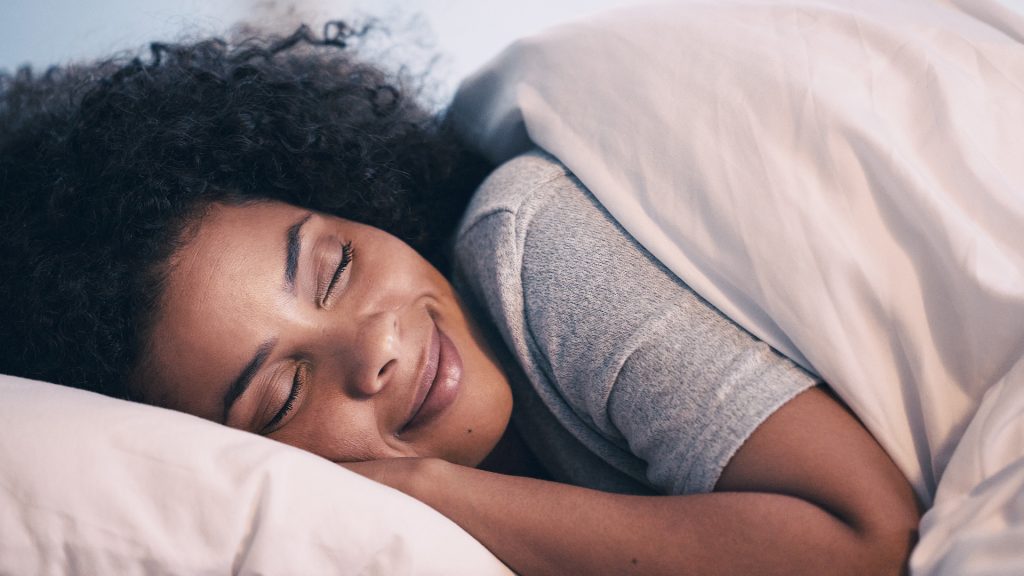
Struggling to fall asleep is a common frustration. When sleeplessness becomes persistent, it can significantly impact your well-being, as the worry about not sleeping often makes it even harder to drift off. Fortunately, a variety of practical techniques and lifestyle adjustments can help you relax, encourage tiredness, and achieve sleep more quickly.
This guide explores proven methods, from breathing exercises and bedtime routines to creating an optimal sleep environment, aiming to help you secure the restful night’s sleep you need.
Table of contents
|
1. Breathing and relaxation techniques to fall asleep quickly |
|
1. Breathing and relaxation techniques to fall asleep quickly
Practising relaxation techniques can be one of the simplest ways to fall asleep faster. These methods help lower anxiety and signal your body to wind down. Consider incorporating one or more of the following exercises into your bedtime routine:
The 4-7-8 breathing method
This technique, rooted in ancient yogic breath control (pranayama), can slow your heart rate and ease anxiety, promoting sleepiness.
- How to do it: Inhale quietly through your nose for a count of 4. Hold your breath for a count of 7. Exhale completely through your mouth, making a whoosh sound, for a count of 8. This completes one breath. Repeat the cycle three more times for a total of four breaths.
- Impact: Even a few cycles can make a difference. Research suggests that breath-focused exercises like this may not only help you fall asleep faster but also improve overall sleep quality.
The “military method” relaxation
This relaxation ritual was reportedly used to help U.S. pilots fall asleep within minutes. It involves progressively relaxing each muscle group and clearing your mind.
- How to do it:
- Relax your facial muscles, including your tongue, jaw, and the muscles around your eyes.
- Drop your shoulders as low as they’ll go. Then relax your upper and lower arm on one side, and then the other.
- Breathe out, relaxing your chest.
- Finally, relax your legs, starting from the thighs and working down to your toes.
- Once your body is relaxed, spend 10 seconds trying to clear your mind before thinking about one of the following three images:
- Lying in a canoe on a calm lake with nothing but a clear blue sky above you.
- Snuggled in a black velvet hammock in a pitch-black room.
- Saying “don’t think, don’t think, don’t think” over and over for 10 seconds.
- Impact: With practice, the military method can significantly reduce the time it takes to fall asleep.
Progressive Muscle Relaxation (PMR)
This classic exercise helps you focus on your body rather than racing thoughts. It involves tensing and then relaxing different muscle groups.
- How to do it: Work from head to toe. For example, raise your eyebrows to tense your forehead for a few seconds, then fully relax it. Squeeze your eyes shut tightly, then relax. Continue this process through all facial muscles, then your neck and shoulders, arms, hands, chest, abdomen, legs, and feet.
- Impact: By consciously releasing physical tension, you signal your nervous system to calm down, inviting drowsiness. Many people find they drift off before completing the full-body sequence.
Mindfulness meditation and body scan
Practising mindfulness in bed can be highly effective for sleep. A body scan meditation involves lying comfortably and mentally checking in with each part of your body, releasing any tension.
- How to do it: Focus on your face and neck, then your shoulders, arms, and so on, down to your toes. Combine this with slow, deep breathing.
- Impact: The goal is to gently anchor your attention on physical sensations rather than anxious thoughts. Studies indicate that mindfulness meditation can improve insomnia and overall sleep quality by engaging the body’s relaxation response. Even 5–10 minutes can make a noticeable difference.
Visualisation and imagery distraction
Instead of worrying in bed, try picturing a calming scenario in your mind, such as a peaceful beach or a gentle waterfall.
- How to do it: Immerse yourself in imagining the sights, sounds, and sensations of this relaxing scene.
- Impact: Visualisation is a form of distraction that can take your mind off real-life stresses. It helps stop the stream of racing thoughts. Some experts suggest visualising a monotonous, gentle task, like driving on a quiet road. The key is to occupy your mind enough to keep worries at bay, but not so much that you stay awake.
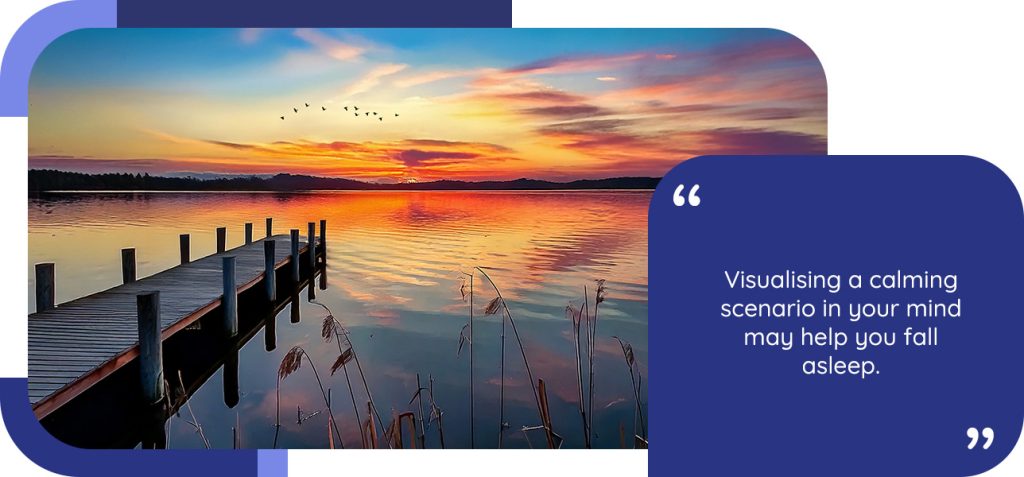
2. Sleep-promoting habits and bedtime routine
Your daily habits and pre-bedtime activities play a crucial role in how quickly you fall asleep. Strategic changes can help synchronise your body’s internal clock and set the stage for faster sleep.
Maintain a consistent sleep schedule
Going to bed and waking up at the same time every day, including weekends, is one of the most effective ways to train your body to fall asleep faster. A regular schedule strengthens your circadian rhythm, the 24-hour internal clock regulating sleepiness and alertness. Over time, your body learns to feel naturally drowsy at your target bedtime. Setting alarms for both bedtime and wake-up can be helpful.
Avoid long daytime naps
If you struggle with falling asleep at night, avoid napping during the day. While a short 20-minute power nap earlier in the day might be acceptable for some, longer or later naps can disrupt your night’s sleep by reducing your sleep drive. Napping, especially in the afternoon or evening, can confuse your body clock. If you must nap, keep it brief (under 30 minutes) and ensure it’s before mid-afternoon.
Get regular exercise (but not too late)
Engaging in moderate exercise during the day can help you fall asleep faster and achieve more deep, restorative sleep. Activities like walking, swimming, or yoga are beneficial. However, try to finish vigorous workouts at least 2–3 hours before bedtime, as exercising too close to bed can be overstimulating for some. If evenings are your only option, choose gentler exercises or stretches.
Watch your evening food and drink intake
What you consume in the hours before bed can significantly impact how long it takes to fall asleep.
- Heavy meals: Avoid large or spicy meals late at night, as digestion can cause discomfort and heartburn. If hungry, a light snack is fine, but finish substantial dinners at least 2–3 hours before bed.
- Caffeine and nicotine: Both are stimulants that can linger in your system. Avoid coffee, tea, cola, and other caffeine sources for at least 6 hours before bedtime. Similarly, refrain from smoking or using nicotine products late in the day.
Limit alcohol before bed
While alcohol might initially make you feel drowsy, it disrupts your sleep cycle, leading to fragmented, poor-quality sleep. Drinking alcohol in the hours before bedtime is linked to more awakenings during the night and less REM sleep. For faster and sounder sleep, it’s best to avoid alcohol before bed or at least stop drinking 3–4 hours prior.
Establish a calming wind-down routine
Spend the last 30–60 minutes before bed relaxing and signalling to your body that it’s time to sleep. Avoid work, bright screens, or anything stressful.
- Calming activities: Consider taking a warm bath or shower (about 1-2 hours before bed, as the subsequent drop in body temperature can trigger sleepiness), doing gentle stretching, reading a physical book, listening to soothing music, or practising a relaxation exercise.
- Dim lights: Dimming the lights in your house during this period can also stimulate melatonin production.
Put away screens and electronics
The blue light emitted from phones, tablets, computers, and TVs can suppress melatonin, the hormone that makes you sleepy. Using these devices before bed can trick your brain into thinking it’s daytime.
- Rule: Stop screen time at least 1 hour before bed.
- Alternatives: If you must use a device, consider night mode or blue-light-blocking glasses, but unplugging entirely is preferable. Turn off non-essential notifications and set your phone to “Do Not Disturb.”
Journal or write down worries before bed
Lingering worries and to-do lists can be major barriers to falling asleep. Offload your thoughts onto paper earlier in the evening.
- Brain dumping: Spend a few minutes jotting down tasks for the next day or writing out concerns. Research indicates that spending just five minutes writing a to-do list before bed can help people fall asleep significantly faster by “offloading” stress about unfinished tasks.
- Bedside journal: Keep a small journal by your bed to note any nagging thoughts that arise during the night, allowing you to deal with them in the morning.
3. Optimising your sleep environment
Your bedroom environment significantly influences how quickly you fall asleep. An uncomfortable bed or a poor sleep setting is a common reason for difficulty sleeping. Creating a sleep sanctuary that is dark, cool, quiet, and comfortable is crucial.
Maintain a cool, dark, and quiet room
Light, noise, and temperature are key signals for our bodies.
- Temperature: Aim for a slightly cool room, around 18°C (65°F), which research suggests is ideal for sleep. A room warmer than 21°C can make it harder to doze off, as your body needs to cool down to initiate sleep. Use a fan, open a window, or adjust bedding as needed.
- Light: A dark room signals your brain to produce melatonin. Use blackout curtains or blinds and consider an eye mask. Even small light sources from electronics can be stimulating. Dim or turn off nightlights.
Noise: Sudden or loud noises can disrupt sleep. Try foam earplugs if noise is beyond your control. A white noise machine or fan can create a consistent, soft sound that masks disruptive noises. Soothing background audio like calm instrumental music or nature sounds can also help, but keep the volume low.
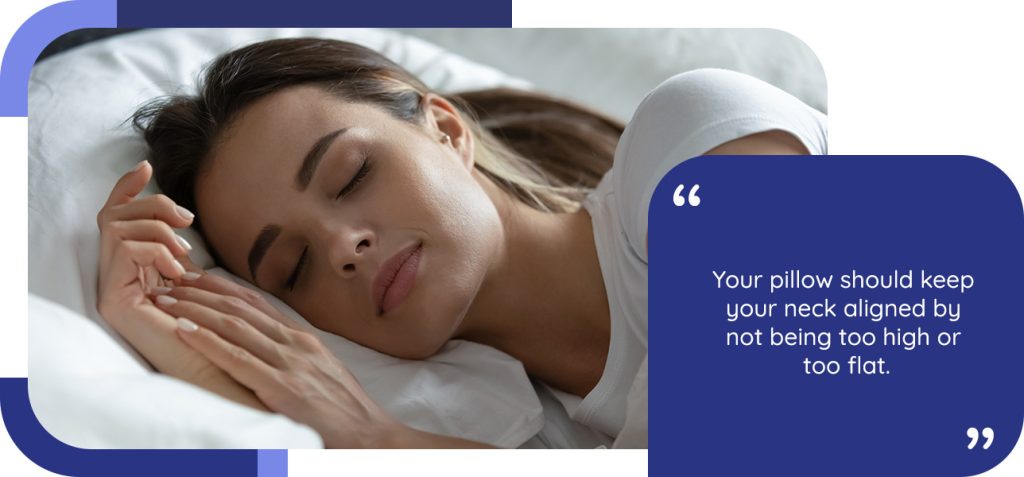
Ensure your bed is comfortable and supportive
An uncomfortable mattress or pillow can severely hinder sleep. If you often wake with stiffness or toss and turn, evaluate your bed.
- Mattress: Experts recommend replacing mattresses approximately every 7–10 years, or sooner if sagging. Your mattress should support the neutral alignment of your spine. Comfort preferences vary, so choose what feels good to you.
- Pillows: Your pillow should keep your neck aligned, not too high or too flat.
- Space: If you share a bed, ensure it’s large enough to prevent disturbances.
Create a tranquil atmosphere with comfortable bedding
Use bedding that feels good against your skin and is appropriate for the season (e.g., breathable cotton in summer, warmer linens in winter). Some people find weighted blankets helpful for anxiety, as the gentle pressure can promote calm.
- Tidiness: Keep your bedroom tidy, as clutter can cause subtle stress.
- Bed association: Reserve the bed primarily for sleep and relaxation. Avoid working or watching intense TV shows in bed to strengthen the mental cue that “bed equals sleep.”
Addressing special needs, such as allergies (consider an air purifier or frequent washing of sheets) or disturbances from pets or children, can also contribute to a more restful environment.
4. What to do when you can’t fall asleep
Even with good habits, occasional nights of sleeplessness can occur. Here are strategies for those restless moments:
Don’t watch the clock
Constantly checking the time increases anxiety about not sleeping. Turn your clock away or place your phone out of reach. Remind yourself that knowing the time won’t help.
Try “paradoxical intention” (i.e. attempt to stay awake)
This counterintuitive psychological trick involves trying to stay awake, which can paradoxically make you sleepy by easing the pressure to fall asleep. Lie comfortably with your eyes open and tell yourself you’re trying to stay awake. Often, your eyes will grow heavy.
Get up and reset if you can’t sleep after 20 minutes
If you haven’t fallen asleep after about 20 minutes, get out of bed and do a quiet, non-stimulating activity in another room with dim lighting. This could be reading a dull book or gentle stretching. Avoid screens. Return to bed when you feel sleepy. This helps prevent an unhealthy association between your bed and wakefulness.
Adjust your sleep position
Sometimes, simply shifting how you’re lying can make a difference. Ensure you’re comfortable. If you sleep on your back, a pillow under your knees can ease back strain. Side-sleepers might benefit from a pillow between their knees. An adjustable bed can make finding the perfect supportive position much easier, potentially relieving pressure or issues like snoring or heartburn.
Listen to relaxing audio
If a racing mind is the issue, calming audio can help. Consider an audiobook, a sleep story, white noise, or ambient sounds like rainfall. The aim is to occupy your brain gently without keeping you alert. Set a timer if using an app.
Do a quick “mind dump”
If worries or to-do lists surface, jot them down on a notepad kept by your bedside. In dim light, write down the thought, then give yourself permission to address it in the morning. This can free your mind to relax.
Avoid stimulating activities if you wake up
Resist the urge to use your phone, watch TV, or check work emails, as these activities will only wake you up more. Opt for calming activities. Remember that even resting in bed with your eyes closed can be restorative.
If insomnia is frequent despite these measures, consider consulting your doctor to check for underlying issues or discuss options like cognitive-behavioural therapy for insomnia (CBT-I).
5. How an adjustable bed helps you sleep faster
If you’ve addressed lifestyle factors and still struggle to fall asleep quickly, your bed itself might be a contributing factor. An uncomfortable or unsupportive bed can significantly hinder sleep. An electric adjustable bed allows you to customise your sleeping position easily, which can be a game-changer.
Customised comfort and support
Instead of struggling with pillows, an adjustable bed lets you elevate your upper body or legs to the precise angle that feels most comfortable.
- Pressure relief: This can relieve pressure on joints, reduce discomfort, and eliminate many aches and pains that might keep you awake. For instance, a slight incline under the knees (the “zero-gravity” position) can ease lumbar pressure. Elevating swollen legs or feet can reduce discomfort.
- Effortless positioning: You no longer need to toss and turn searching for a comfortable spot; the bed adjusts to support you, allowing relaxation to come more quickly.
Relief for health issues that disrupt sleep
Many health conditions that interfere with sleep can be alleviated by an adjustable bed.
- Acid reflux/heartburn: Keeping the upper body elevated can prevent stomach acid from causing discomfort.
- Snoring/sleep apnoea: Sleeping at an incline can improve airway flow and significantly reduce snoring episodes. An adjustable base maintains this optimal position throughout the night, unlike pillows that can shift.
- Pain management: Some adjustable beds, like those from Adjustamatic, offer built-in massage therapy systems (e.g., Cyclo-Therapy). This can soothe pain from conditions like arthritis or fibromyalgia, further aiding relaxation and speeding up the process of falling asleep.
Partner-friendly sleep setup
Sleep disruption from a partner’s movements or snoring is common.
- Individual positioning: Adjustable beds, especially split models (where each side adjusts independently), allow each person to find their own ideal sleep position. This can reduce disturbances from tossing and turning.
- Snoring reduction: Elevating the head of the snorer’s side of the bed can help alleviate snoring, benefiting both partners. Some advanced models even include features that automatically adjust the bed when snoring is detected.
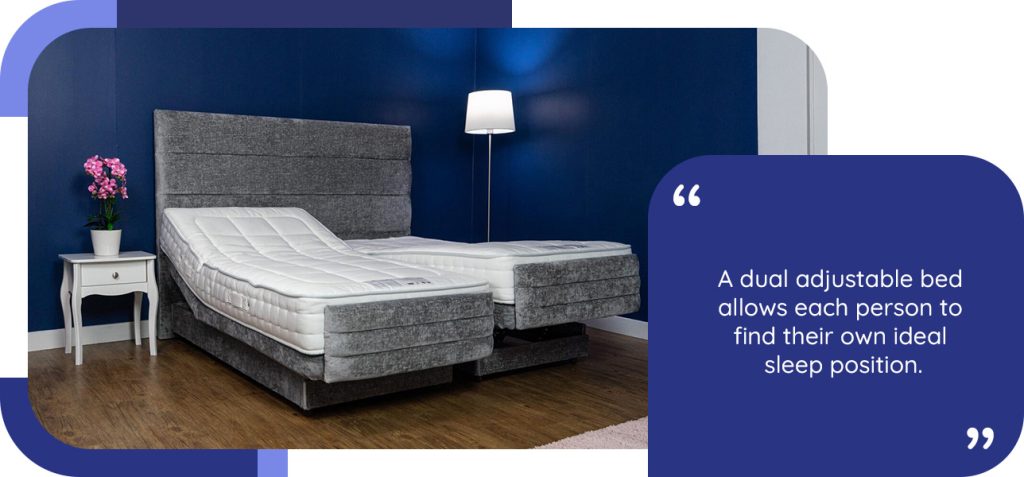
6. Ready to transform your sleep experience?
If you’ve been struggling with falling asleep quickly and this guide has shown you how an adjustable bed could be part of the solution, it might be time to explore how Adjustamatic can help you achieve the restful sleep you deserve. We’re not just about beds; we’re about creating personalised sleep solutions that enhance your well-being and support your journey to better sleep.
Why choose Adjustamatic for your sleep transformation?
At Adjustamatic, we pride ourselves on decades of British craftsmanship, with every adjustable bed being built to the highest standards right here in the UK. This commitment to quality is why we can offer a market-leading 15-year guarantee on our adjustable mechanisms, giving you lasting peace of mind.
But it’s more than just adjustability. Our beds feature:
Advanced sleep-enhancing technology
Find your perfect position for faster sleep at the touch of a button. Our innovative EASY REACH® technology ensures your bedside essentials remain within reach even when the bed is adjusted. Many of our beds include therapeutic benefits such as our NHC Cyclo-Therapy® massage system, designed to soothe aches, ease tension, and promote deeper, more restful sleep.
Designs tailored to your sleep needs
Choose from a range of models including the lightweight Majestic adjustable bed, which combines practicality with modern style. Select your preferred size, headboard design, and pick from stylish, high-quality fabrics to create a bed that perfectly complements your bedroom sanctuary.
Expert guidance and aftercare
Our friendly, UK-based team is dedicated to understanding your specific sleep challenges. From your initial enquiry, through to a no-obligation home demonstration where you can experience how an adjustable bed could help you fall asleep faster, and for the entire lifespan of your Adjustamatic product, we’re here to offer professional advice and support. We can also advise on VAT exemption for qualifying conditions.
Take the first step toward falling asleep faster
If you’re tired of lying awake at night and would like to learn more about how an Adjustamatic adjustable bed can help you fall asleep more quickly and enjoy better quality rest, our expert team is ready to assist. We can provide you with a detailed brochure, answer any questions you may have, and, if you wish, arrange a free, no-obligation home consultation and trial.
Call us today free on 0800 689 9823 (lines open 9am-5pm Monday to Friday) or send us a message to request your free brochure and discover how an adjustable bed could be the key to faster, more restful sleep.
Sweet dreams await with Adjustamatic.
